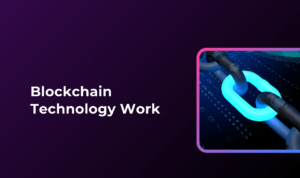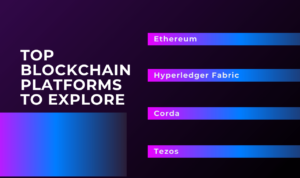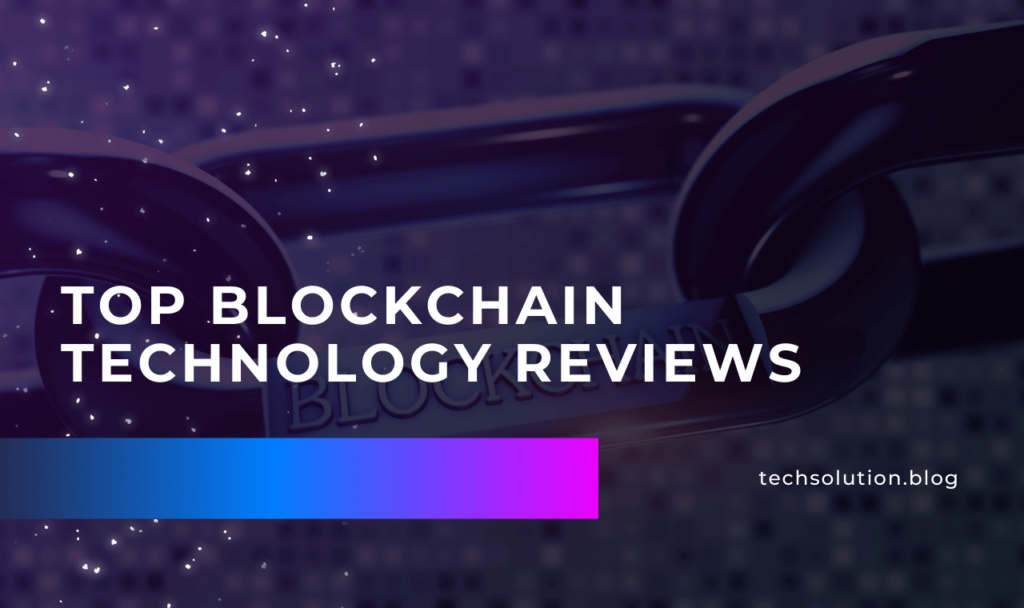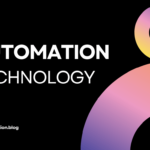Blockchain is no longer just a buzzword—it’s reshaping industries with remarkable speed, from finance to supply chains. In fact, the global blockchain market is projected to hit $67.4 billion by 2026, driven by growing demand for transparency and security. But with so many emerging platforms, how do you know which ones are worth your time and investment?
This 2024 guide breaks down the top blockchain technologies making waves in the UK. Whether you’re a business leader eyeing the right infrastructure or a tech enthusiast tracking industry trends, we’ve got you covered. You’ll find in-depth reviews on the leading players, actionable insights, and key comparisons tailored to help you make smart, informed decisions.
Ready to navigate the blockchain landscape with confidence? Let’s dive in!
What is Blockchain Technology?

Blockchain technology offers a decentralized digital ledger that securely and transparently records transactions across multiple computers. Unlike traditional databases, it stores information in blocks linked in a chain, ensuring data integrity and preventing unauthorized changes. When a transaction occurs, a network of computers (nodes) verifies it, adds it to a block, and appends it to the chain chronologically.
Blockchain operates without relying on a central authority, enhancing security by making data tampering nearly impossible. Changing information in one block requires altering the entire chain, which demands consensus from the network. It also secures data through cryptographic techniques, protecting it from fraud.
Blockchains fall into two categories: public blockchains (like Ethereum or Bitcoin), accessible to anyone, and private or permissioned blockchains (like Hyperledger Fabric), which restrict access to authorized participants. While blockchain first emerged to support cryptocurrencies like Bitcoin, it now powers applications across industries such as finance, supply chain management, healthcare, and real estate by offering transparency, efficiency, and security.
Why is Blockchain Popular?
Blockchain technology has gained widespread popularity because it offers transparency, security, decentralization, and efficiency, addressing several challenges in traditional systems.
Here are the key reasons driving its adoption across industries:
- Decentralization:
Blockchain removes the need for a central authority, such as banks or intermediaries, by distributing data across a network of computers (nodes). This reduces dependency on third parties, lowers operational costs, and minimizes single points of failure. - Transparency and Immutability:
Every transaction recorded on the blockchain is visible to all participants, creating a transparent system that enhances trust. Once data is added to a block and validated, it becomes immutable, meaning no one can alter or delete it without network consensus. This makes blockchain ideal for industries that require accountability, such as supply chains and finance. - Security through Cryptography:
Blockchain technology uses cryptographic methods to secure data, protecting it from fraud and hacking attempts. Every transaction is encrypted, and nodes must reach consensus to validate transactions, making unauthorized changes highly unlikely. This high level of security attracts industries dealing with sensitive data, such as healthcare and banking. - Efficiency and Automation:
Blockchain streamlines processes by removing intermediaries and enabling direct peer-to-peer transactions. With Salesforce, these capabilities are further enhanced, offering businesses seamless integration and improved efficiency. Smart contracts—self-executing agreements built on blockchain—automate transactions based on predefined conditions, reducing delays, paperwork, and human errors.
Why Blockchain Technology Matters in 2024
Blockchain is revolutionizing industries from finance to healthcare. Its ability to offer transparency, decentralization, and enhanced security has become a sought-after technology across various sectors. In the UK, organizations leverage blockchain to streamline operations, reduce fraud, and ensure data integrity. However, choosing the right platform can be overwhelming with so many available solutions.
This guide breaks down the best blockchain technology reviews list UK offers, giving you insights into features, performance, and customer experiences.
How Does Blockchain Technology Work?

Blockchain technology is a decentralized digital ledger that records transactions securely, transparently, and tamper-proof. Here’s a breakdown of how it works step-by-step:
1. Initiating a Transaction
A transaction begins when one party submits data, such as transferring cryptocurrency, updating records, or executing a smart contract. This request triggers the creation of a block that contains all relevant transaction details, including time, date, and the parties involved.
2. Verification by Nodes
A network of computers, called nodes, verifies the transaction. Each node ensures the transaction is valid according to predefined rules (for example, checking if the sender has enough cryptocurrency for the transfer). This decentralized verification process removes the need for a central authority, such as a bank or administrator.
3. Consensus Mechanism
Once verified, nodes reach an agreement using a consensus mechanism to approve the transaction. The two most common mechanisms are:
- Proof of Work (PoW): Requires nodes to solve complex mathematical problems (used by Bitcoin).
- Proof of Stake (PoS): Selects validators based on the amount of cryptocurrency they hold (used by Ethereum 2.0).
What You’ll Find in This Guide
- Comprehensive Reviews: A detailed look at the top blockchain platforms in the UK.
- Use Cases and Applications: Where these technologies excel and how companies use them.
- Performance and Security: Evaluating each platform’s reliability and protection.
- Cost and Scalability: Comparing pricing models and future growth potential.
Top Blockchain Platforms to Explore

1. Ethereum – The Smart Contract Pioneer
Ethereum stands as a leading platform in the blockchain world and is known for pioneering the concept of smart contracts. It is particularly ideal for developing decentralized applications (DApps) and non-fungible tokens (NFTs). A key reason for its popularity is its large developer community and well-established ecosystem, which offer continuous innovation and support.
However, the platform’s significant drawback lies in its high gas fees, which can impact the affordability of transactions, especially during periods of high network demand.
2. Hyperledger Fabric – Tailored for Enterprises
Hyperledger Fabric targets enterprise needs, providing private and permissioned networks. The platform offers scalability and prioritizes privacy, making it an excellent choice for businesses that require controlled data access.
Hyperledger Fabric’s architecture allows companies to maintain confidentiality while still benefiting from blockchain’s decentralized structure. However, its complexity introduces a steeper learning curve for developers, which can pose a challenge during adoption and implementation.
3. Corda – Designed for Finance and Trade
Corda is a blockchain platform optimized for financial institutions and trade networks, focusing on secure and fast transactions. Its architecture ensures data privacy, which is crucial for sensitive information industries.
Corda’s strength lies in its ability to streamline financial operations by reducing transactional friction. However, the platform’s specialized design means it is mostly confined to specific industries, which can limit its adoption outside of finance and trade sectors.
4. Tezos – Self-Amending Blockchain
Tezos offers a unique feature as a self-amending blockchain, making it ideal for asset tokenization and governance-based solutions. Its standout feature is upgrading seamlessly without undergoing hard forks, ensuring smooth transitions and adaptability to future changes. This capability enhances the platform’s longevity and stability.
However, Tezos is still relatively new in the market, which means it has fewer mainstream applications and a smaller user base than established blockchain platforms.
How to Choose the Right Blockchain Platform
- Assess Your Business Needs: Determine the level of decentralization, transparency, and security you require.
- Evaluate Platform Scalability: Look at how well the solution can grow with your business.
- Check User Reviews: Customer feedback offers insights into real-world performance.
- Consider Support and Community: A strong developer community can ease troubleshooting.
Final Thoughts
Choosing the best blockchain platform can seem daunting, but this blockchain technology reviews list UK guide simplifies the process. With this breakdown of top platforms, use cases, and expert insights, you’ll be well-equipped to select the right solution for your business needs in 2024.
Blockchain technology is reshaping the future—don’t get left behind! Dive into these reviews and unlock the potential that suits your vision.
Whether it is Ethereum, the pioneer of the concept of smart contracts, Hyperledger Fabric, which can effectively protect corporate privacy, Corda, which is designed for finance and trade, or Tezos, which can self-amend, each blockchain platform has its unique features, attracting more and more financial and technology enthusiasts.
If you are also interested in blockchain platforms or have friends who are interested in blockchain technology, you can choose to customize blockchain-related keychains at CustomKeychains.Com to express your love and blessings to your friends.
CustomKeychains.Com supports personalized customization. You can choose your favorite blockchain platform pattern, related token pattern, and other favorite elements as materials for design. The unique keychain can express your concern for the blockchain platform and your good wishes for the prospects of the financial currency market.




